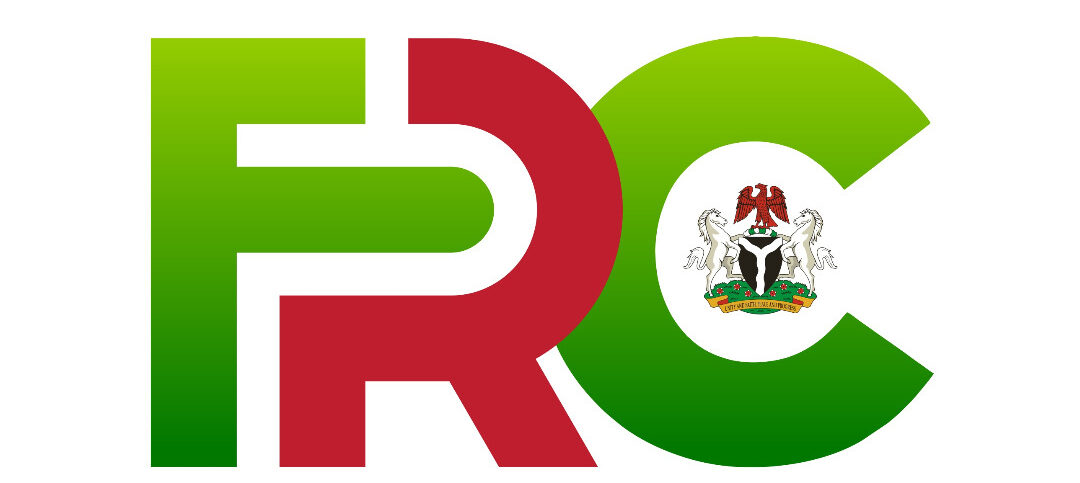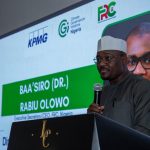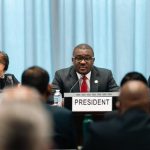Test
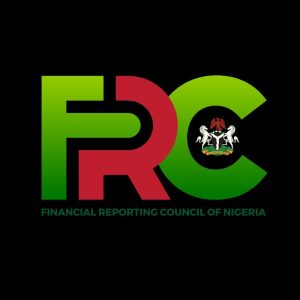
Financial Reporting Council of Nigeria Updated Position on IAS 29 Financial Reporting in Hyper-inflationary Economies.
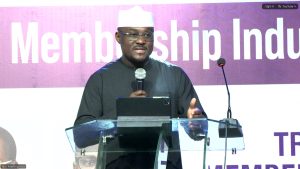
Dr. Olowo Charges Newly Inducted Estate Valuers to Uphold Ethics, Integrity
The Executive Secretary of the Financial Reporting Council of Nigeria (FRC), Dr. Rabiu Olowo, on Thursday, December 4, 2025, urged newly inducted estate surveyors and valuers to uphold the highest standards of ethics, integrity, and professionalism as they enter the field.
He stressed that their work now carries legal, financial, and national implications, making accuracy and accountability non-negotiable.
Dr. Olowo said this in Lagos, where he spoke as the guest speaker at the 2025 induction ceremony for new members of the Nigerian Institution of Estate Surveyors and Valuers (NIESV).
The ceremony formally ushered new members into the community of professional valuers, symbolises continuity, renewal, and the deepening of a long-standing tradition of excellence. He urged the new inductees to produce reports that would withstand the scrutiny of auditors, regulators, investors, and the courts.
Dr. Olowo added, “As you take your professional oath, I urge you to embrace continuous learning. Valuation is dynamic. Markets evolve, standards change, regulatory expectations shift, and the world increasingly demands transparency.
“You must equip yourselves with the knowledge and discipline necessary to remain relevant, compliant, and competitive. Uphold the ethics of your profession. Avoid conflicts of interest. Document your assumptions rigorously.
“Challenge information that appears unreliable. Produce reports that can stand the scrutiny of auditors, regulators, investors, and courts. Above all, be honest in your methods, in your judgments, and in your interactions with clients and stakeholders”.
Olowo, reminded the inductees that the day’s event was a milestone and also a beginning step for them.
“You are stepping into a field that holds enormous opportunity; opportunity to shape national development, to deepen financial transparency, to restore public trust, and to strengthen accountability in both the private and public sectors.
“As a regulator, I can assure you that the FRC values the role of the valuation profession. We consider you indispensable partners in the journey toward a more credible financial reporting regime, a stronger capital market, and a more resilient national economy,” the FRC boss said.
Dr. Olowo stated that FRC, through the Directorate of Valuation Standards, has invested significantly in building capacity.
“Not too long ago, the Council concluded the Nationwide Training Tour on valuation for Financial Reporting, where we engaged about 1000 professionals across the cities of Lagos, Abuja, Port Harcourt and Kaduna.
“The Council has also integrated Valuation for Financial Reporting methodologies into all its training programmes. We have also developed the Valuation for Financial Reporting guide and distributed it at no cost to professionals in all our engagements.
“The Directorate of Valuation Standards of the FRC is not merely a desk; it is an emerging institution within the FRC, established to regulate valuation for financial reporting, develop guidance materials, review valuation practices through inspection activities, and ensure that valuation reports used in financial statements meet the standards expected of a modern, transparent, and credible economy,” he said.
He emphasized that the Directorate of valuation standards at the FRC remains not just as a partner in professional growth, but it also a regulator.
“It will support you through training and engagement, but it will also hold you accountable to the responsibilities you accept today,” Dr. Olowo added.
Dr Olowo further reminded the inductees that they are not merely joining a profession but are becoming custodians of trust.
“You will be producing valuation reports that have legal, financial, and reputational implications for organisations. Your assessments of fair value will influence decisions on loans, investments, mergers and acquisitions, insurance claims, government asset management, and even court proceedings.
“When companies publish their annual financial statements, your work will be embedded in the figures that investors use to decide whether to buy or sell shares. Regulators will depend on your work to assess solvency, capital adequacy, and compliance.
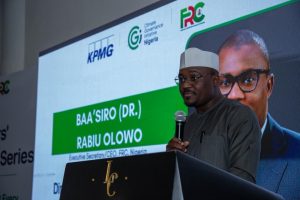
Climate and Sustainability Governance Now a Core Board Duty, FRC Tells Directors
The Executive Secretary/Chief Executive Officer of the Financial Reporting Council of Nigeria (FRC), Dr. Rabiu Olowo, has delivered a clear message to directors of Nigerian corporate firms that climate and sustainability governance is now a core fiduciary responsibility.
Dr. Olowo delivered this message on Wednesday, November 26, 2025, in Lagos, in a welcome address during the Climate Governance Initiative (CGI) Nigeria Directors’ Engagement Series at Lagos Continental Hotel.
The theme of the series is “IFRS S1 and S2 – What Every Board Needs to Know.”
He said: “For boards, the message is clear: climate and sustainability governance is now a core fiduciary responsibility.
“Directors must ensure that sustainability disclosures are decision-useful, verifiable, comparable, and integrated with financial information. “This means strengthening internal processes, improving data quality, building capacity within management teams, and ensuring that risk management frameworks fully incorporate climate-related scenarios.”
He added: “It also means moving from symbolic commitments to measurable actions that reflect genuine board oversight and accountability.”
Dr. Olowo said that”today’s conversation is timely and strategic, as boards across the world navigate an increasingly complex corporate landscape—one where sustainability information is no longer peripheral but central to value creation and long-term resilience.
“I commend CGI Nigeria for bringing directors together to deepen understanding of IFRS S1 and IFRS S2, the two standards that are redefining global expectations around sustainability-related disclosures,” he said.
The Executive Secretary of FRC also said that “as many of you are aware, Nigeria—through the Financial Reporting Council—was the first country in Africa to declare early adoption of International Sustainability Standard Board (ISSB) standards at CoP 27 at Sharm Sheikh in Egypt in 2022.
“We did not just declare and went to sleep, we swung into action by walking the talk with the creation of the Adoption Readiness Working Group (ARWG), a technical think tank, comprising of major stakeholders in Nigeria in Financial Reporting and Corporate Governance landscape.
“The entities such as Central Bank of Nigeria, Securities and Exchange Commission, Nigeria Exchange Group, Professional Accountancy Organizations (PAOs), the Big 4 Assurance firms, some premium board listed companies in Nigeria and independent sustainability and ESG professionals were co-opted into the Group.”
He explained that the Adoption Readiness Working Group worked tirelessly for eight (8) through virtual, physical meetings and a retreat to come up with the document known today as the Roadmap Report for Adoption of IFRS Sustainability Disclosure Standards in Nigeria.
“The effort has yielded exemplary results and delivered milestones in Nigeria, currently being modelled in Africa:
“Most recently, FRC won UNCTAD – ISAR Award in Sustainability Leadership Reporting in an event held at Palais des Nations, Geneva, Switzerland, the only African country to be so honoured”.
“FRC was the first country in Africa to declare early adoption of ISSB Standards at COP 27 in Egypt;
“Produced the first set of early adopting entities in Nigeria, “the first movers”, the likes of: MTN, Seplat Energy, Fidelity and Access Banks; “A set of voluntary Adopters (fast followers) are currently at various stages of their documentation to adopt ISSD IFRS S1 and S2; “Conducted more than 32 webinars, training, workshops and engagements towards advocacy for sustainability reporting; “Trained more than 168 entities with over 1,806 participants across the sector specific industry-wide trainings;
“Featured Nigeria in the recently released ISSB Global Reporting as one of the 17 Jurisdictional Profiles on Sustainability; “Strong partnership and collaboration with Nigerian Integrated Reporting Committee, ACCA, ICAN, ANAN, and other International Agencies (MOUs); including CGI Nigeria.”
Dr. Olowo highlighted that the FRC remains committed to supporting all institutions – listed, unlisted, premium-board companies and other public interest entities – in this transition. “We are deepening regulatory guidance, expanding stakeholder engagements, and working with partners such as CGI Nigeria to enhance the capacity of directors and preparers. Our goal is simple: to ensure that Nigerian companies are not just compliant, but leading, credible, and globally competitive in sustainability reporting.
“In closing, I urge every board represented here to view IFRS S1 and S2 not as regulatory burdens, but as strategic tools—frameworks that will help your organizations anticipate risks, seize new opportunities, and build trust with stakeholders.
“The future of business is sustainable, transparent, climate-conscious, and governed by data-driven decision making. Your leadership and insight will determine how well your organizations adapt, innovate, and succeed,” Dr. Olowo added.
In her welcome remarks, the Executive Director of CGI Nigeria, Mrs. Olawunmi Asekun, said the meeting ess to demystify what IFRS S1 and S2 is all about., adding that Nigeria faces sector wide exposure to climate risks in energy, agriculture, manufacturing, finance, infrastructure, etc.
Asekun said: “We provide NEDs with strategic guidance to manage this evolving landscape.” She added that IFRS S1 and S2 are transforming how companies disclose sustainability and climate information. “We equip boards to lead credible transition plann, risk oversight and scenario analysis.”
In her presentation, Partner and Head, Enterprise Risk and ESG, KPMG, Mrs. Tomi Adepoju, said that sustainability reporting has evolved into a global standard for corporate accountability, moving from voluntary to mandatory disclosures.
Adepoju also said directors must care because “sustainability reporting has strategic importance and regulatory momentum and directors must be actively involved to drive it.”
She said today companies across industries are expected to provide transparent information on their environmental, social and governance performance. She identified drivers of sustainability as investor expectations, evolving global risks and opportunities, stakeholders pressure and regulatory evolution.
Also, the Chairman of Nigerian Integrated Reporting Committee, Dr. Innocent Okwuosa, said that there is the need to take sustainability advocacy to the directors and the boards of corporate organizations because they are the ones that could make it possible for the implementation to hold.
Okwuosa said: “So they must be aware of the resources with which this implementation can be done.” He added that nothing would happen without the buy-in of the board.
“That is why we said that for us to realize the FIRS S1 and S2 the board must come on board,” Okwuosa said.
He said the board should appreciate that sustainability has evolved from being an act of CSR to a corporate strategy that shows how it is adapting to its business environment.
“All the issues we are talking about affects the business model, affects the value chain and affects how a firm should do business,” he said.
Okwuosa also said that sustainability should not be viewed from a risk perspective, as it embodied opportunities in the evolving consumer behavior, which is tilting toward low-carbon products.
He warned that companies that are not sensitive to these changes will exist in the past and continue to produce products that consumers would not accept.

FRC Wins UNCTAD-ISAR ‘Leadership in Sustainability Reporting’ Honours, Emerges as Only African Country Recognized
The Financial Reporting Council of Nigeria (FRC) on Thursday, November 13, 2025, received the prestigious International Standards on Accounting and Reporting (ISAR) Honours from the United Nations Conference on Trade and Development (UNCTAD) Intergovernmental Working Group of Experts on Accounting and Reporting.
Interestingly, Nigeria was the only African country that was honored by the global body.
The feat was in recognition of the Dr. Rabiu Olowo-led Council’s exceptional leadership, groundbreaking reforms, and transformative contributions to advancing sustainability reporting and corporate transparency in Nigeria.
The award was presented to the Council during the ISAR Honours Celebration, which took place as part of the 42nd Session of the Intergovernmental Working Group of Experts on International Standards of Accounting and Reporting (ISAR), currently being held at the Palais des Nations, Geneva, Switzerland.
Nigeria was awarded based on the FRC’s leadership in developing a credible and globally aligned sustainability reporting framework, its multi-stakeholder engagement through the Adoption Readiness Working Group (ARWG), and its successful implementation of national reforms that positioned sustainability disclosure as a central pillar of Nigeria’s corporate governance and financial reporting system.
In addition, the award was a reflection of the impact of FRC in the sustainability reporting landscape not only in Nigeria but globally with the Adoption Readiness Roadmap being a template for other countries.
The endorsement of the National Roadmap for the Adoption of IFRS Sustainability Disclosure Standards (IFRS S1 and S2) by President Bola Ahmed Tinubu in 2024, played a pivotal role in advancing Nigeria’s sustainability reporting initiatives.
This endorsement not only reinforced the country’s commitment to adopting sustainability reporting but also translated Nigeria’s pledge made at COP 27 into concrete action.
Also, it underscored the government’s strong political will to integrate sustainability and climate-related reporting into Nigeria’s economic framework, aligning with global best practices.
To facilitate the successful implementation of these actions and build local capacity, the Council, under the leadership of Dr. Olowo, trained over 2,000 professionals. Additionally, it strengthened collaborations with international development partners, including the German Agency for International Cooperation (GIZ), to promote sustainable finance and support capacity development efforts.
Speaking after receiving the award, Dr. Olowo said: “This honour reaffirms Nigeria’s leadership in advancing sustainability and transparency. It reflects our collective commitment to building a trusted, globally competitive reporting environment that promotes accountability, responsible investment, and sustainable growth.”
The recognition at ISAR 42, which is still ongoing in Geneva, underscores Nigeria’s growing influence in shaping global sustainability reporting standards and highlights the FRC’s pivotal role in promoting transparency, responsible business conduct, and sustainable development across Africa.
Dr. Olowo, the Executive Secretary/CEO of the FRC, had on,Wednesday, 12 November 2025, formally concluded his tenure as Chair of the 41st Session of the United Nations Intergovernmental Working Group of Experts on International Standards of Accounting and Reporting (ISAR) at the United Nations Palais des Nations in Geneva, Switzerland.
Olowo had left a legacy of global impact at the UN body as Nigeria once again affirmed its leadership in advancing global financial and sustainability reporting standards.
The ceremony, which was marked by the conduct of the elections and formal handover of the ISAR Chairmanship, constituted the conclusion of a record milestone of remarkable achievements by the FRC boss.
Dr Olowo was in November 2024, elected as the Chair of the 41st session of the UNCTAD-ISAR.
The prestigious appointment was a testament to Dr. Olowo’s exceptional leadership and expertise in corporate reporting, which he had used in transforming and repositioning the FRC.
